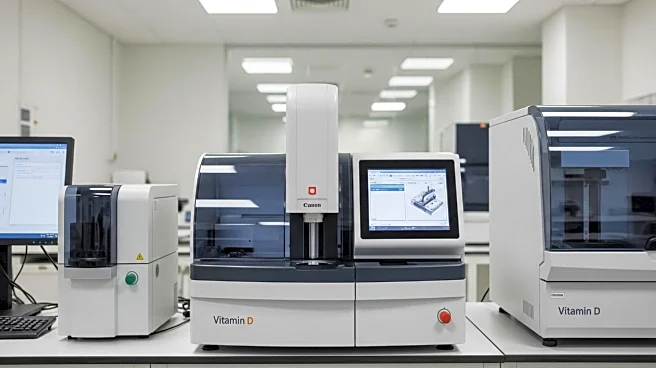What's Happening?
Roche has announced that its Ionify 25-Hydroxy Vitamin D total assay has been categorized as 'Moderate Complexity' under the Clinical Laboratory Improvement Amendments of 1988 (CLIA) by the U.S. Food and Drug Administration (FDA). This marks the first time a mass spectrometry-based test has received this designation, allowing a wider range of clinical laboratories to access advanced testing. The assay operates on Roche's cobas i 601 analyzer, which is part of the cobas Mass Spec solution. This development is significant as it combines mass spectrometry's sensitivity and specificity with a standardized workflow, streamlining complex testing and reducing variability across labs. Traditionally, such tests were limited to highly specialized labs due to complex workflows and the need for expert operators.
Why It's Important?
The CLIA 'Moderate Complexity' categorization for Roche's Ionify Vitamin D test is a breakthrough in routine diagnostics, enabling more laboratories to deliver highly accurate results efficiently. This advancement is expected to improve patient care by helping clinicians make better-informed decisions. The automation achieved by Roche's proprietary chemistry allows for faster, more reproducible, and environmentally sustainable workflows compared to conventional mass spectrometry methods. This reduces the need for outsourcing advanced testing, potentially lowering costs and increasing accessibility for healthcare providers and patients.
What's Next?
Roche plans to expand its U.S. pipeline for the cobas Mass Spec solution, with additional mass spectrometry assays anticipated globally. The company is committed to further transforming healthcare delivery by integrating diagnostics and pharmaceuticals with data insights from clinical practice. Roche's participation in initiatives like the Science Based Targets and Sustainable Markets Initiative underscores its commitment to achieving net zero by 2045, indicating ongoing efforts to enhance sustainability in healthcare.
Beyond the Headlines
The categorization of Roche's Ionify Vitamin D test as 'Moderate Complexity' may influence the broader diagnostics industry by setting a precedent for mass spectrometry-based tests. This could lead to increased competition and innovation in the field, driving advancements in personalized healthcare. The move also highlights the importance of scalable automation in reducing variability and improving the reproducibility of diagnostic tests, which could have long-term implications for laboratory practices and patient outcomes.










